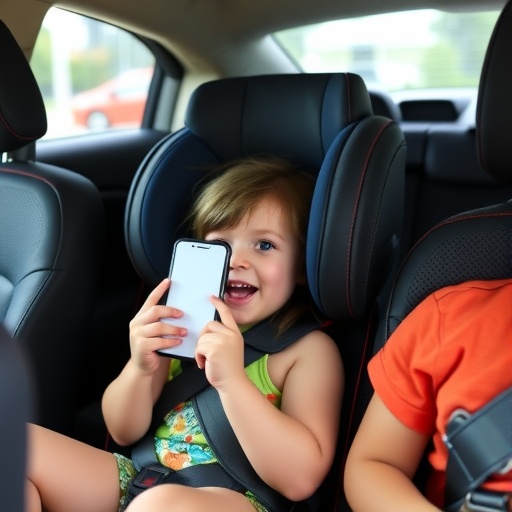A groundbreaking randomized clinical trial published in JAMA Network Open reveals that a comprehensive remote intervention strategy markedly improves parental adherence to guidelines on appropriate child car seat usage. The study, led by Dr. Michelle Macy of the Stanley Manne Children’s Research Institute and Northwestern University Feinberg School of Medicine, combines motivational counseling, tailored web content, and mobile technology to influence parental behavior and enhance child passenger safety.
Children’s safety in vehicles remains a persistent public health challenge, with previous research by Dr. Macy indicating that nearly 70% of children involved in fatal car crashes in the U.S. were not restrained according to the American Academy of Pediatrics (AAP) recommendations. These recommendations specify the optimal type of car seat based on a child’s age, weight, and height, and are critical for reducing injury risk. Despite this knowledge, parents face psychological and practical barriers that impede compliance, including a false sense of security when transitioning to seat belts or booster seats and inconvenience associated with car seat changes.
In this trial, 474 parents with children aged between six months and under eleven years who initially reported non-adherence to recommended car seat guidelines were enrolled. Non-adherence entailed actions such as children riding in the front seat, failure to use age- and size-appropriate restraints, or even traveling unrestrained. The intervention cohort received an integrated program that delivered personalized feedback based on parents’ periodic photographic submissions of their child’s typical car travel setup, complemented by regular motivational messaging and relevant web-based educational content.
At the six-month milestone, results demonstrated a significant uptick in guideline adherence – intervention group parents were 13 percentage points more likely to comply with AAP car seat recommendations than those given standard education materials alone. This adherence disparity widened to nearly 40 percentage points at the one-year follow-up, underscoring the sustained impact of tailored, engaging, and supportive communication strategies on parental behaviors.
Dr. Macy emphasizes the psychological underpinning of this success, noting that connecting parents’ intrinsic values about child well-being with practical knowledge enhances motivation and self-efficacy for proper car seat use. The intervention’s personalized nature, adapting educational content and feedback based on direct observation of real-life habits, works to dismantle misconceptions and habitual non-compliance. This novel approach surpasses generic guideline dissemination, fostering a more profound and durable commitment to child passenger safety.
Notably, the intervention’s most pronounced effect was observed among parents of children aged three to ten years – an age group historically challenging for guideline enforcement due to a transitional phase where children often resist booster seats or rear-facing designs. The diminished influence on parents of children younger than three years spotlights an urgent need for specialized motivational tools and instruction tailored toward early infancy safety practices, particularly emphasizing extended use of rear-facing seats, which are critical in mitigating cervical spine injuries during collisions.
The implications for pediatric primary care are profound. The study advocates that healthcare providers integrate motivational interviewing techniques into routine consultations, asking open-ended, non-judgmental questions about children’s travel habits. Such dialogue can reveal instances of non-adherence and create openings for reassurance, encouragement, and connection to community resources such as certified child passenger safety technicians. This personalized approach aligns with preventive medicine principles, recognizing the importance of behavior modification as an integral component of injury prevention strategies.
In parallel with the trial, Ann & Robert H. Lurie Children’s Hospital of Chicago instituted a sophisticated alert system embedded within the MyChart online health portal. This system automatically notifies parents about when to transition their child to the next recommended car seat stage, considering age, weight, and height metrics. Providing timely, relevant, and actionable information in accessible digital formats demonstrates the power of health informatics in promoting adherence and preventing injuries.
This blend of behavioral science, personalized medicine, and digital health underscores a paradigm shift in pediatric injury prevention. It exemplifies how longitudinal, interactive interventions can trigger sustained behavior change. The study also highlights the necessity of continuous education and reinforcement given the evolving developmental stages of children and the nuances of car seat technology and guidelines.
Moreover, these findings impress upon policymakers and public health practitioners the value of scaling similar interventions, particularly through telemedicine and mobile platforms, which have become increasingly important amid changing healthcare delivery landscapes. Remote interventions can bridge geographical and socioeconomic barriers, ensuring wider reach and equity in child safety education.
At its core, this research champions the integration of motivational science with technological innovation to address a leading cause of pediatric morbidity and mortality in vehicle crashes. By prioritizing empathy, tailored communication, and resource connectivity, the intervention aligns parental intentions with actionable practice, ultimately safeguarding millions of young passengers.
Dr. Macy’s work reflects the commitment of the Stanley Manne Children’s Research Institute and Ann & Robert H. Lurie Children’s Hospital to advancing child health through rigorous, translational research. The institution’s dedication to training pediatricians, conducting cutting-edge research, and launching pragmatic safety programs embodies the future of pediatric medicine, where evidence-backed strategies are seamlessly woven into everyday clinical care and public health initiatives.
Subject of Research: Child passenger safety, parental adherence to car seat guidelines, behavioral intervention, pediatric injury prevention
Article Title: Parents’ Use of Motivational Counseling and Mobile Support to Increase Appropriate Child Car Seat Utilization: A Randomized Clinical Trial
News Publication Date: Not specified
Web References:
Stanley Manne Children’s Research Institute – Michelle Macy
AAP Child Passenger Safety Recommendations
Keywords: Children, Personalized medicine, Preventive medicine, Clinical studies
Tags: American Academy of Pediatrics recommendationsbarriers to car seat compliancechild passenger safety behaviorsenhancing child safety in vehiclesimpact of technology on parentingimproving child restraint usemobile-based child safety interventionsmotivational counseling for parentsparental adherence to car seat guidelinespsychological factors in child safetyrandomized clinical trial on car seatsremote intervention strategies for child safety





